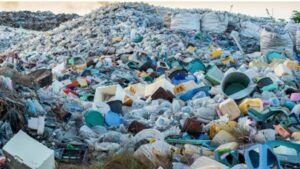
Why in News
-
Global plastic pollution is rising at dangerous levels
-
According to the Organisation for Economic Cooperation and Development, plastic waste is expected to triple by 2060 to reach 1.2 billion tonnes
-
This creates a major ecological and health threat
-
Scale of the Crisis
-
Rapid Growth
-
Global plastic production doubled between 2000–2019
-
Reached 460 million tonnes, mainly due to packaging and fast-consumption products
-
-
Poor Recycling
-
Only 9% of plastics are recycled
-
Most end up in landfills, rivers, and open dumps
-
-
Marine Pollution
-
About 11 million tonnes of plastic enter oceans every year
-
Harms marine life and contaminates the food chain
-
-
Microplastics
-
Plastics break down into micro and nano particles
-
Found in soil, air, water, and even in human blood and lungs
-
-
Future Projection
-
If no urgent reforms are made, plastic waste will almost triple by 2060
-
This will overwhelm global waste systems
-
Major Problems of Plastic Pollution
-
Persistence
-
Plastics take hundreds of years to decompose
-
Causes permanent accumulation in ecosystems
-
-
Climate Impact
-
Plastic production and burning contribute 3.4% of global greenhouse gas emissions
-
Worsens climate change
-
-
Biodiversity Loss
-
Animals like turtles, seabirds, and fish swallow plastics
-
Leads to starvation, poisoning, and reproductive harm
-
-
Human Health Risks
-
Toxic chemicals such as carcinogens and endocrine disruptors mix with food and water
-
Affects fertility, immunity, and overall health
-
-
Economic Losses
-
Marine plastic pollution causes around 13 billion dollars in yearly losses
-
Affects fisheries, shipping, and tourism industries
-
Initiatives to Fight Plastic Pollution
-
Global Efforts
-
-
United Nations Environment Assembly Treaty (2022): 193 nations agreed to work on a legally binding treaty to end plastic pollution by 2024
-
Sustainable Development Goals: Reducing plastic supports SDG 12 (responsible consumption), SDG 13 (climate action), and SDG 14 (life below water)
-
Circular Economy: Campaigns worldwide pushing reuse, recycling, and redesign to reduce dependence on new plastic
-
-
Indian Efforts
-
-
Plastic Waste Management Rules 2016 and 2022: Ban on certain single-use plastic items and enforcement of producer responsibility
-
Swachh Bharat Mission 2.0: Focus on complete waste collection, segregation, and proper processing
-
Plastic Roads: More than 1.2 lakh kilometres of Indian roads built using waste plastic, saving bitumen and improving road durability
-
Role in Tackling the Crisis
-
Individuals
-
-
Refuse single-use plastics like straws, bottles, and bags
-
Segregate waste at home into wet and dry categories for easier recycling
-
Support eco-friendly brands and packaging
-
-
Communities and Society
-
-
Organise collective clean-up drives in beaches, rivers, and parks
-
Create plastic banks where people can exchange waste plastic for rewards
-
Work with private recyclers and NGOs to improve local waste management
-
-
Governments
-
-
Make and strictly enforce laws against banned plastics
-
Ensure companies take back used packaging and meet recycling targets (Extended Producer Responsibility)
-
Impose taxes on landfilling and incineration while giving subsidies for eco-friendly packaging and research
-
Way Forward
-
Follow 6Rs: Refuse, Reduce, Reuse, Recycle, Recover, Redesign
-
Shift to a circular economy with products designed for reuse and recycling without losing value
-
Invest in research for bio-based and compostable plastics and advanced recycling technologies
-
Strengthen local governments like panchayats and urban bodies with funds and authority for waste management
-
Encourage behavioural shift by making zero-plastic lifestyles popular through media campaigns and influencers
Conclusion
-
Plastic pollution is a man-made disaster threatening climate, biodiversity, and human health
-
It can only be tackled through combined efforts of governments, industries, communities, and individuals
-
A plastic-free future is essential for environmental justice and sustainable development




